
1. Selecting Wei-Chung Wang In The Rule 5 Draft
As much fun as Wei-Chung Wednesdays were, I wish they never happened. The Wei-Chung Wang story is a cautionary tale for anyone looking to select a young pitcher in the Rule 5 Draft.
The Milwaukee Brewers selected the then-22 year old lefty back in the 2013 Rule 5 Draft, with the idea of keeping him on the roster long enough to retain his rights and then continue to develop him in the minors. At that point, Wang had never pitched above Rookie ball, and he was about to get promoted to the big leagues immediately.
How could that plan possibly go wrong?
Unsurprisingly, Wang struggled out of the Crew’s bullpen in 2014. He didn’t make his first appearance until April 14th, and regularly went more than a week in between appearances, never pitching in more than four games in a month. Ron Roenicke was (rightfully) scared to put him out there.
More from Brewers News
- Brewers: 4 Players Who Must Step Up for the Crew to Make the Playoffs
- Brewers: Yet Another Huge Promotion For Top Prospect Jackson Chourio
- Brewers Making Colossal Mistake With Corbin Burnes’ Contract
- Which Players May Be In The Final Month Of Their Brewers Careers?
- Brewers: Where Does Devin Williams Stand In NL Reliever Of The Year Race?
By not wanting to pitch him, the Brewers were effectively a man down in their bullpen for a whole season, wasting a roster spot on a pitcher that they could only use in blowout situations where it didn’t matter how bad he did. That meant the rest of the bullpen had to pick up the slack.
In July, after another poor outing, Wang was diagnosed with “shoulder tightness” after meeting the minimum amount of time required to stay on the active roster to retain his rights, and spent pretty much the rest of the season on the DL, making only one appearance in September. The team could finally replace Wang with a big league ready pitcher, but the damage had already been done.
By the end of that season, the bullpen was worn out, and the team that had spent so many days in first place in that fateful 2014 season faded down the stretch and completely missed the playoffs, leading to a rebuild that started the next season.
One could argue that Wang’s acquisition was the lynchpin to that process. If it weren’t for Wang, that bullpen would’ve been at full strength, and they would’ve likely been able to perform better in August and September, and perhaps still make the playoffs. That was one of the most disappointing seasons I’ve ever been a part of.
The Crew retained his rights and sent him to the minors the next season. He worked his way back to the big leagues three years later in 2017 as a 25 year old that was supposedly big league ready. Wang once again struggled, allowing two runs in 1.1 innings spread across eight appearances. He was only allowed to face more than one batter on one occasion, and he allowed a home run in that instance. Only in half of his appearances did he get someone out. He still couldn’t be trusted to pitch in the big leagues.
He was released the following winter. Wei-Chung Wang was a failed experiment that never should’ve happened in the first place. This acquisition backfired more than the Brewers bargained for, and it cost them in more ways than one.
I wish I was joking when I say that the Brewers chose to bring in a pitcher that had never pitched above Rookie-Ball and moved him immediately up to the big leagues and forced a first-place team into having a short-handed bullpen, and indirectly caused that team to crumble towards the end of the season, kickstarting a rebuilding process. I wish that was a joke. But nope, that’s what the Milwaukee Brewers did.
The Brewers didn’t select Wang on April Fools Day, nor did they make any other transaction on this list on April 1st, but they might as well have, because the moves were jokes anyways.
